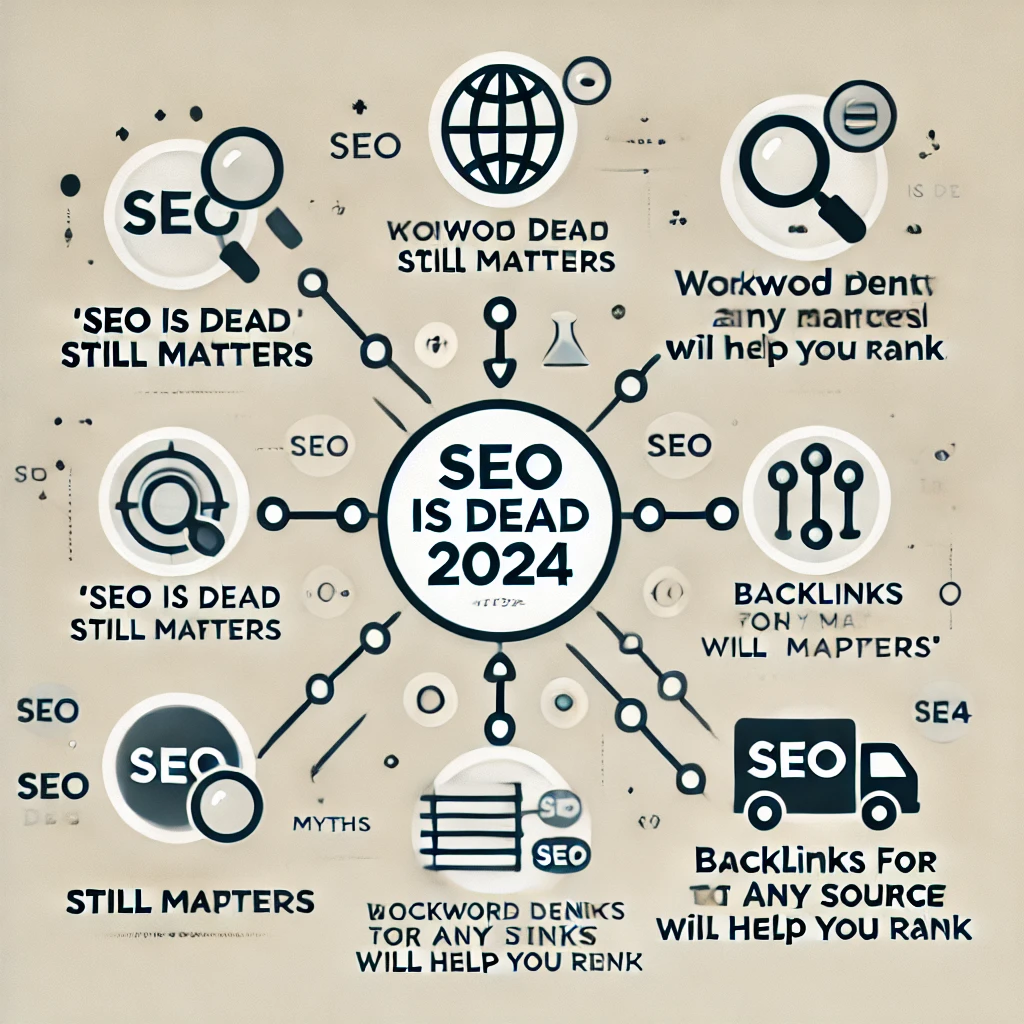Introduction
In the dynamic world of SEO, keyword research tools are fundamental for building a solid strategy. However, the landscape is filled with myths that often mislead marketers. In this blog, we will cover two important topics:
- Top 10 Keyword Research Tools for SEO, which can enhance your search rankings and content planning.
- Top 10 SEO Myths for 2024, which you need to bust to stay ahead in the SEO game.
Top 10 Keyword Research Tools for SEO
Keyword research is the cornerstone of SEO, as it helps you understand what your audience is searching for. The right tools can significantly streamline your efforts by providing insights into search volume, competition, and potential ranking opportunities. Let’s dive into the top 10 keyword research tools for SEO.

Google Keyword Planner
Google Keyword Planner is the most widely & one of the free keyword research tools because it’s directly connected to Google Ads. It’s perfect for discovering new keywords, estimating search volumes, and finding cost-per-click (CPC) data.
- Pros: Free, reliable data from Google, CPC data included.
- Cons: Limited keyword suggestions compared to paid tools.
Ahrefs Keyword Explorer
Ahrefs Keyword Explorer is one of the most powerful keyword research tools in the SEO toolkit. It provides detailed keyword metrics such as search volume, keyword difficulty, click-through rates (CTR), and related keyword suggestions.
- Pros: Advanced metrics, in-depth keyword research, competition analysis.
- Cons: Expensive for small businesses or freelancers.
SEMrush
SEMrush is an all-in-one SEO platform that also offers comprehensive keyword research features. Its magic keyword research tools are excellent for uncovering long-tail keywords and analyzing competitive data.
- Pros: Detailed keyword metrics, competitor analysis, and related keywords.
- Cons: Expensive for beginners.
Ubersuggest
Neil Patel’s Ubersuggest is a free tool for keyword research, offering users access to search volume data, keyword difficulty, and content ideas. Ubersuggest is beginner-friendly and ideal for those new to SEO.
- Pros: Free, easy to use, provides keyword suggestions and difficulty.
- Cons: Limited advanced metrics.
Moz Keyword Explorer
Moz Keyword Explorer provides a mix of unique data like organic CTR and difficulty scores. The tool also offers a Priority Score, combining search volume, difficulty, and CTR for an overall rating of keyword value.
- Pros: Intuitive interface, advanced features, Priority Score metric.
- Cons: Paid tool with a limited free trial.
AnswerThePublic
AnswerThePublic is a visual keyword research tool that turns search queries into categories such as questions, prepositions, and comparisons. This is particularly useful for discovering long-tail keywords that reflect real user queries.
- Pros: Great for long-tail keyword discovery, free version available.
- Cons: Limited keyword metrics, mostly question-based searches.
KWFinder
KWFinder by Mangools is a straightforward and user-friendly keyword research tool for finding low-competition keywords. It provides detailed keyword difficulty scores, search volume data, and related keyword suggestions.
- Pros: Simple to use, excellent for finding low-competition keywords.
- Cons: Limited features in the free version.
Soovle
Soovle offers suggestions from multiple platforms, including Google, Bing, Amazon, and YouTube. This can be especially helpful if you are looking to optimize for more than just Google.
- Pros: Pulls keyword data from multiple platforms, easy to use.
- Cons: Limited SEO metrics.
KeywordTool.io
KeywordTool.io generates thousands of keyword suggestions based on a single input and pulls data from Google, YouTube, Bing, and more. It’s a good alternative to Google’s Keyword Planner.
- Pros: Multi-platform data, good for long-tail keywords.
- Cons: Premium version required for full metrics.
Long Tail Pro
Long Tail Pro focuses on helping users discover long-tail keywords that are easier to rank for. It offers a proprietary Keyword Competitiveness (KC) score to gauge keyword difficulty.
- Pros: Great for long-tail keyword research, user-friendly.
- Cons: Paid tool, limited features in the free version.
Conclusion on Keyword Research Tools
These tools are essential to building a robust keyword strategy for SEO. Depending on your budget and needs, you can choose from free or premium options, but each one offers unique insights that can help improve your SEO rankings.
Top 10 SEO Myths for 2024
SEO is an ever-evolving field, and with that comes a lot of misinformation. In 2024, several myths continue to circulate, leading marketers astray.
Let’s debunk the top 10 SEO myths that you need to avoid.

SEO is Dead
Every few years, you’ll hear that SEO is dead. However, SEO is far from obsolete. In fact, it’s more important than ever, especially as search engines become smarter and user intent plays a larger role in rankings.
- Reality: SEO is evolving, not dying. The focus is now more on providing value and user experience rather than gaming the system with keywords.
Keyword Density Still Matters
There’s a persistent myth that you need to hit a specific keyword density to rank higher. This used to be true, but search engines have evolved beyond simple keyword counting.
- Reality: Focus on writing naturally and providing value. Overstuffing your content with keywords can lead to penalties.
Backlinks from Any Source Will Help You Rank
Backlinks are an essential ranking factor, but not all backlinks are created equal. Some SEO practitioners believe that more backlinks, regardless of quality, will always help.
- Reality: Google focuses on the quality, relevance, and authority of backlinks. Low-quality or spammy backlinks can harm your rankings.
Social Media Directly Impacts SEO
There’s a misconception that social media activity directly impacts SEO rankings. While social media can drive traffic to your site, it doesn’t directly affect your rankings.
- Reality: Social media helps with content distribution, engagement, and brand awareness but isn’t a direct ranking factor for SEO.
Exact Match Domains are Critical for Rankings
Once upon a time, having an exact match domain (EMD) would give your site an SEO advantage. For example, a site named “bestlaptops.com” might have ranked well for “best laptops.”
- Reality: Google has reduced the weight of exact match domains. Now, quality content and user experience are more important for ranking.
Mobile SEO Isn’t That Important
With the rise of mobile browsing, some still think mobile SEO is secondary to desktop SEO.
- Reality: Mobile-first indexing means that Google primarily uses the mobile version of your site for ranking. If your site isn’t mobile-friendly, you’re losing out on rankings and traffic.
Long-Form Content Automatically Ranks Better
There’s a belief that longer content always ranks better. While long-form content can perform well, it’s not the length alone that counts.
- Reality: Quality, not quantity, is key. Long-form content should be engaging and valuable to users. If shorter content answers the user’s query, it can rank just as well.
You Only Need to Do SEO Once
Some businesses believe that SEO is a one-time task. They think optimizing their site once is enough to secure long-term rankings.
- Reality: SEO requires ongoing effort. Search engine algorithms change frequently, competitors optimize their sites, and user behavior evolves. Continuous optimization is necessary to maintain and improve rankings.
Paid Ads Improve Organic Rankings
It’s a common myth that running paid ads will automatically boost your organic search rankings.
- Reality: Paid ads (Google Ads) and organic rankings are separate. Investing in paid ads won’t directly affect your organic SEO, but it can complement your SEO strategy by driving traffic.
More Pages Mean Better Rankings
Some people believe that having more pages automatically leads to better rankings. They create low-quality pages to increase their page count.
- Reality: Quality over quantity is the golden rule. Thin content or pages with little value can lead to penalties, while fewer high-quality pages can rank much better.
Conclusion on SEO Myths:
SEO myths can lead marketers down the wrong path, wasting time and resources. It’s essential to stay updated on industry trends and best practices. By understanding the realities of SEO, you can create a strategy that aligns with modern search engine algorithms.
